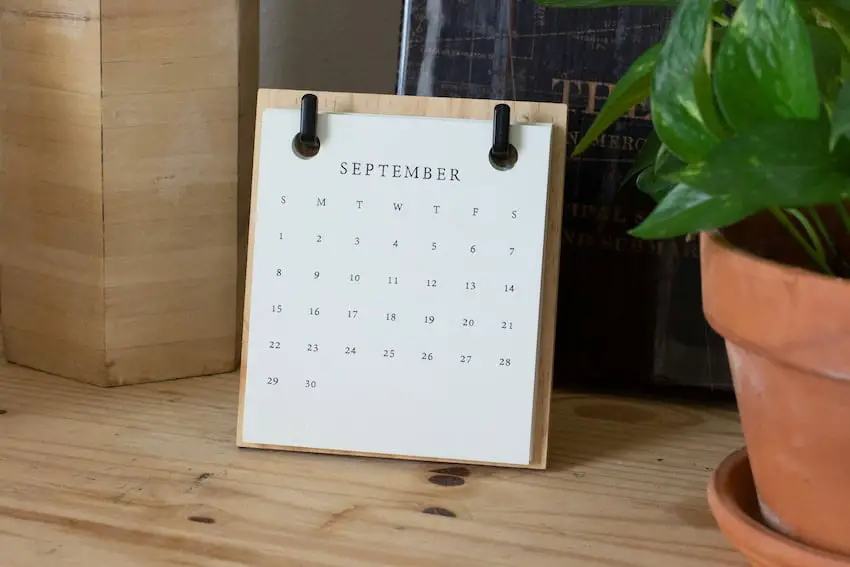Talk about time in Spanish with our easy video guide

Hey everyone! Today we’re diving into the world of time expressions. The other day I met a girl from California who just moved to Mexico. She is learning Spanish and honestly, she’s doing amazing despite the fact that she has been here for a week!
It occurred to me to bring these phrases to you because everytime I would ask her something that had to do with time, she would get very confused on how to use time expressions in Spanish to talk about when she moved, how long she’s been learning or when we could meet for coffee in the near future. So if you identify with her and have been there yourself, I am here to help you out.

Let’s get started with how we talk about the past, present and future in Spanish.
Ayer (yesterday)
Examples in context:
In the kitchen
A: Ya voy a tirar este queso. (I’m going to throw away this cheese)
B: ¿Por? (Why’s that?)
A: Caducó ayer. (It expired yesterday)
At the doctor
A: ¿Cuándo empezó el dolor? (When did the pain start?)
B: Apenas ayer me empecé a sentir mal. (I started to feel bad around yesterday)
Antier (the day before yesterday)
Examples in context:
On the phone
A: Paquetería San Miguel, buenas tardes. (Shipping company, good afternoon)
B: Hola señorita, quería preguntar cuándo llega mi paquete porque ya se pasó la fecha de entrega. (Hello, I would like to ask when my package is due to arrive? The delivery date has already passed)
A: ¿No se lo han entregado? (You haven’t received it?)
B: No, aún no me llega. (No, I haven’t)
A: Déjeme revisar porque le debió haber llegado antier. (Let me check because it should have been delivered the day before yesterday)
Talking about the weather
A: ¿Qué tal está el clima? (How’s the weather?)
B: Hoy está a gusto pero ayer y antier llovió muchísimo. (It’s really nice today but yesterday and the day before yesterday it was pouring)
Pasado mañana (the day after tomorrow)
Examples in context:
Going on a trip
A: ¿Cuándo sale su avión? (When is your flight departing?)
B: Pasado mañana. (The day after tomorrow)
A: Ah, pensé que mañana. (Oh, I thought it was tomorrow)
Planning a meeting
A: ¿Entonces para cuándo planeamos la junta? (So, when should we have the meeting?)
B: ¿Para pasado mañana no?, ¿qué dices? (The day after tomorrow, don’t you think?)
A: Sí, me parece perfecto. (Sounds great)
Making plans
A: Hay que irnos a tomar un café en la semana. (We should meet for coffee sometime during the week)
B: Sí! ¿Pasado mañana te queda bien? (Sure thing, the day after tomorrow works for you?)
Hace una semana/mes/año (a week/month/year ago)
Examples in context:
Casual talk
A: Ya me tengo que poner las pilas, hace una semana que no hago ejercicio. (I really need to hit the ground running, it’s been a week sinced worked out)
B: ¡Yo hace un mes que no voy al gym! (It’s been a month since I worked out at all!)
Meeting someone
A: Y, ¿cuándo llegaste a México? (When did you arrive in Mexico?)
B: Hace una semana. (A week ago)
A: ¿Tú eres de aquí? (Are you from here?)
B: No, soy de Argentina. (No, I am from Argentina)
A: Ah, ¡cool! ¿Cuándo llegaste? (Oh, cool, when did you get here?)
B: Hace un año que me mudé. (I moved a year ago)
I hope these examples help you use these expressions more naturally in your next conversations. Remember your Spanish can only keep improving, not decaying. You can do this!!!
Paulina Gerez is a translator-interpreter, content creator, and founder of Crack The Code, a series of online courses focused on languages. Through her social media, she helps people see learning a language from another perspective through her fun experiences. Instagram: paulinagerezm / Tiktok: paugerez3 / YT: paulina gerez
Source: Mexico News Daily

